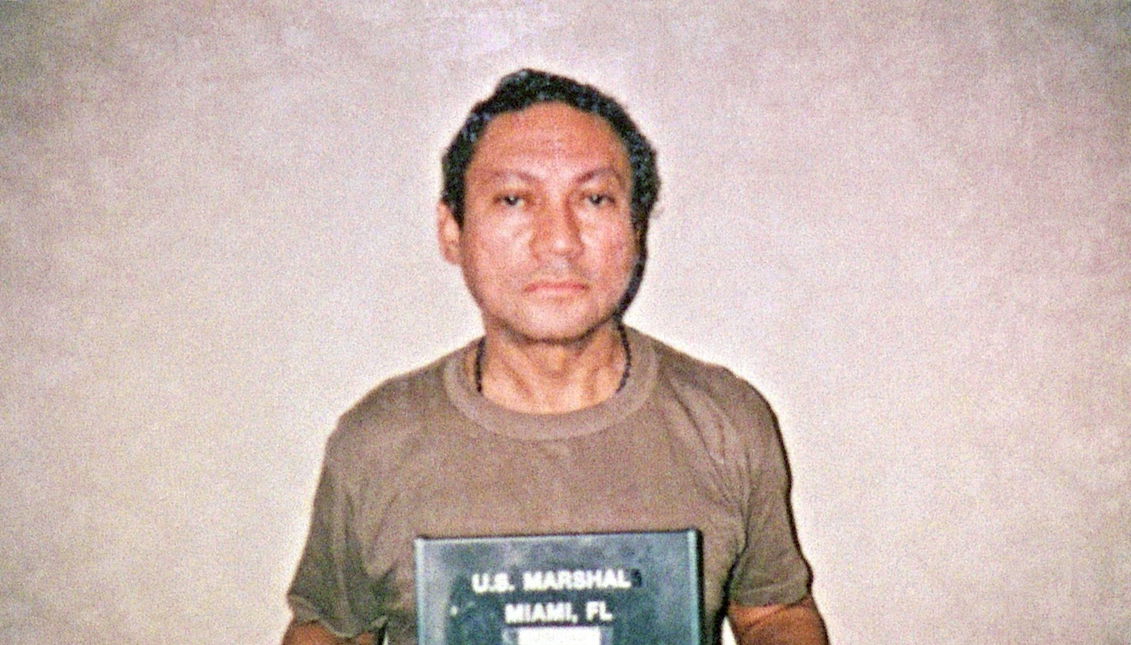
Panama’s “strong man”, Manuel Noriega, dies
After nearly three decades in prison, condemned by justice for the acts committed during his dictatorship, Manuel Antonio Noriega has died at age 83 of a brain…
"Death of Manuel A. Noriega closes a chapter of our history," wrote on twitter the current president of Panama, Juan Carlos Varela, also pleading for respect for the mourning of his relatives.
Born on February 11, 1934 in Guachimango, Panama, in a poor home, Noriega was abandoned by his parents at the age of 5. After a frustrated career in psychiatry, Manuel Antonio Noriega enrolled in the armed forces, where he was able to attend the military school of Chorrillos in Peru, thanks to a scholarship. He then obtained an engineering degree.
Upon his return to Panama he joined the National Guard with the rank of second lieutenant. He later specialized in information and counterintelligence at an American base in Fort Gulick, located in the Panama Canal area.
The CIA then recruited him, and he would collaborate with the agency for much of his career.
Noriega served as head of military intelligence for General Omar Torrijos, who led the military coup of 1968. After Torrijos' death in a plane crash in 1981, Noriega became Panama's "strong man" during the 1980s.
The interest of the American government over Panama was then in its strategic geographical position, especially for trade and economic agreements as a waterway between the Atlantic and Pacific oceans. After keeping superficial relations of cooperation during the autocratic rule of Noriega, and after the assassination of the opposition leader Hugo Spadafora in 1985 - who denounced the relations of the dictator with the drug traffic - the government of the United States decides to suspend the economic and military aid to the country Central America, issuing sanctions of assets against the government.
In June 1987, Noriega’s former chief of Staff, Colonel Roberto Diaz Herrera, accuses him of electoral fraud, drug trafficking and the murder of Spadafora.
According to the French journal Le Monde, the American press echoed the accusations at that time, with headlines praying "The saga of the Panamanian general Manuel Antonio Noriega is one of the most serious failures in the foreign policy of The United States", quoting statements by a Senate commission calling him "a key player in the Medellin cartel. "
By 1989 Noriega had already been accused by the United States on charges of money laundering and drug trafficking; for sharing confidential information with Cuba, selling arms to Latin American guerrillas, and for having strong ties to Pablo Escobar, head of the Medellin cartel, a relationship which would have provided him with a millionaire fortune, according to CNN En Español.
The discontent of the Panamanian people decanted in strong confrontations and riots against the "Battalions of the dignity", a paramilitary force formed by Noriega. "The annulment of the May 1989 presidential election, won by opposition leader Guillermo Endara Galimany, aggravated the tension with Washington. Noriega called himself 'chief executive' and declared the 'state of war' against the United States, "according to Le Monde.
The assassination of an American lieutenant on the part of the Panamanian military was the perfect pretext for the then president Bush to authorize the invasion to Panama on December 20, 1989, with a battalion of 24,000 soldiers. The result was thousands of civilian deaths and massive exile. Noriega surrendered on January 3, 1990.
RELATED CONTENT
The next day Noriega was transferred to Miami for prosecution that would be sentenced to 40 years in prison for drug trafficking. Subsequently, his sentence was reduced to 30 years for good behavior.
According to CNN, Noriega's trial found that the CIA had financed the dictator for many years, until he refused to "participate in the anticommunist efforts led by the agency ... in Central America during the decade of 1980".
The French government - which had previously granted him the Legion of Honor in 1987 - convicted Noriega in 1999 for defiance, and on April 26, 2010 they requested his extradition to convict him for money laundering, granting him a sentence of ten years.
In December 2011, Panama requested his extradition to be tried in national courts for the murder of several opponents.
In 2015, Noriega made public his apologies to the country for the acts committed during his regime and even for having been the cause of the American invasion in 1989.
Noriega underwent a high-risk surgery on March 7 to try to remove a brain tumor, after which he presented complications that required a coma induction for having triggered a severe hemorrhage. Due to his condition, he was granted hospital prison, until he died.
According to El País, former ally of Noriega and former National Guard Rubén Darío would have assured that "the health of the Panamanian autocrat was deteriorating but that reality had been inflated to get him released."
Manuel Noriega is one of the few dictators in Latin America who died in prison.











LEAVE A COMMENT:
Join the discussion! Leave a comment.